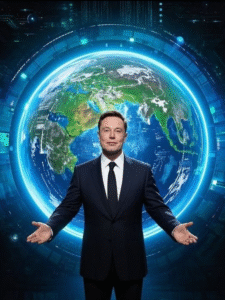🌍 Elon Musk and the Endless Update for Earth: Humanity’s Backup Plan
Elon Musk has never been one to think small. From electric cars to reusable rockets, his vision for humanity stretches far beyond the confines of Earth. But in recent months, Musk has intensified his warnings about the planet’s long-term future, calling for urgent action to prepare for what he calls “the inevitable update”—a transformation of civilization that includes leaving Earth behind.
This isn’t science fiction. It’s Musk’s roadmap for survival.
🚨 The Warning: Earth’s Expiration Date
In a series of interviews and public statements throughout 2025, Musk has reiterated a stark prediction: “Eventually, all life on Earth will be destroyed by the sun.” He’s not alone in this belief. NASA and Tōhō University researchers recently confirmed that Earth will become uninhabitable in roughly 450 million years due to rising solar radiation. By the year 1,000,002,021, the sun will have expanded into a red giant, likely engulfing Earth entirely.
While that timeline may seem distant, Musk argues that the preparation must begin now.
“We do at some point need to be a multiplanet civilization,” Musk told Fox News. “Because Earth will be incinerated.”
🚀 Mars: Humanity’s Life Insurance
Musk’s solution? Colonize Mars.
He views the Red Planet not just as a scientific frontier, but as “life insurance for life collectively.” His company, SpaceX, has already launched eight Starship missions, with two partially successful flights in 2025 alone. The goal is to create a self-sustaining Martian civilization—a backup for humanity in case of war, climate collapse, or cosmic catastrophe.
Why Mars?
- It’s far enough from Earth to survive global conflicts.
- It has resources like water ice and carbon dioxide.
- It offers a chance to reboot civilization with lessons learned.
Musk believes that even if Earth faces a “dark age,” Mars could preserve the seed of human knowledge and culture.
🧠 The Philosophy Behind the Update
Musk’s vision isn’t just technological—it’s philosophical. He sees humanity as a software system in need of constant updates. Earth, in this metaphor, is the hardware. And like any aging device, it has limitations.
- Climate change is accelerating.
- Political instability is rising.
- Resource depletion is inevitable.
Rather than waiting for collapse, Musk advocates for proactive evolution. Colonizing Mars is just one part of a broader strategy to future-proof civilization.
🛠️ The Tools of Transformation
To achieve this “endless update,” Musk is deploying a suite of technologies:
1. Starship
The most powerful rocket ever built, designed for interplanetary travel. Fully reusable and capable of carrying 100+ passengers.
2. Neuralink
A brain-computer interface that could enhance human cognition and communication—especially useful in harsh Martian environments.
3. Tesla Energy
Solar panels and battery systems to power off-grid colonies and reduce dependence on Earth’s fragile energy infrastructure.
4. The Boring Company
Tunnel systems that could be used for underground habitats on Mars, shielding colonists from radiation and extreme temperatures.
🧬 The Biological Challenge
One of the biggest hurdles in Musk’s plan is biology. Humans evolved for Earth’s gravity, atmosphere, and ecosystem. Mars offers none of these.
To adapt, Musk envisions:
- Genetic engineering to enhance resilience.
- Artificial habitats with Earth-like conditions.
- Robotic assistants to handle dangerous tasks.
He’s also exploring cryogenic preservation and AI-driven medicine to extend human lifespans—essential for long-term space travel.
🧭 Critics and Controversies
Not everyone agrees with Musk’s vision. Critics argue that:
- Resources should be focused on fixing Earth, not abandoning it.
- Mars colonization is a distraction from urgent climate action.
- The risks of space travel—radiation, isolation, failure—are too high.
Some ethicists worry about the implications of creating a new society on Mars. Who governs it? What rights do colonists have? Will it replicate Earth’s inequalities?
Musk responds by saying:
“We can do both. We can fix Earth and prepare for the future.”
🧠 The Psychological Shift
Musk’s campaign is also about changing how people think. He wants humanity to adopt a cosmic perspective—to see Earth not as the end, but as the beginning.
This shift involves:
- Teaching space science in schools.
- Promoting planetary stewardship.
- Encouraging innovation and risk-taking.
It’s a mindset that values exploration, resilience, and long-term thinking.
🕊️ Earth’s Role in the Update
Despite his warnings, Musk isn’t giving up on Earth. He continues to invest in sustainable technologies, disaster preparedness, and global connectivity.
His message is clear: Earth is our home—but not our only hope.
By updating our systems—technological, social, and philosophical—we can extend life’s reach beyond one planet.
🌌 The Legacy of the Update
If Musk succeeds, his legacy won’t be just rockets or cars. It will be a civilization that dared to evolve.
- A species that refused to go extinct.
- A planet that gave birth to interplanetary life.
- A future where updates never end.
Whether you agree with him or not, Musk’s vision challenges us to think bigger, act bolder, and imagine a future where humanity thrives—on Earth and beyond.


